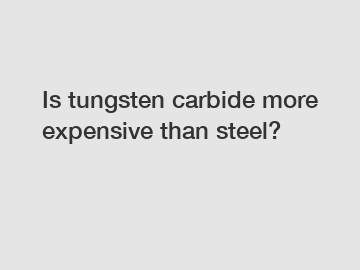Is tungsten carbide more expensive than steel?
You will get efficient and thoughtful service from JIMS CARBIDE.
Is Tungsten Carbide More Expensive Than Steel? .
Tungsten carbide and steel are both widely used materials in various industries. However, when it comes to cost, there seems to be some confusion. In this article, we will delve into the pricing of tungsten carbide and steel, exploring their differences, applications, and factors that contribute to their respective costs. So, is tungsten carbide more expensive than steel?

1. Composition:
Tungsten carbide is a compound made from tungsten and carbon atoms. It is an incredibly hard and wear-resistant material, making it ideal for cutting tools, drilling bits, and industrial machinery. On the other hand, steel is an alloy of iron and carbon, with various other elements added to enhance its strength and other properties. Being versatile, steel is used in construction, automotive, aerospace, and many other industries.
2. Manufacturing Process:
The manufacturing processes for tungsten carbide and steel significantly impact their costs. Tungsten carbide is produced through a complex process involving mixing finely powdered tungsten and carbon, compacting it into a specific shape, and then sintering it using intense heat and pressure. These processes make tungsten carbide labor-intensive and require specialized equipment, resulting in higher production costs. On the contrary, steel production involves melting iron and carbon, followed by casting, hot rolling, and finishing. Though steel also demands specific machinery and refining techniques, it is less time-consuming and less costly compared to tungsten carbide manufacturing.
3. Raw Material Costs:
Both tungsten and carbon are relatively expensive raw materials. Tungsten has a high melting point and is a rare element, making it costly to mine and refine. Additionally, its demand in various industries contributes to its higher price. Carbon, although widely available, needs to undergo purification processes to achieve the required purity level for tungsten carbide production. Steel, primarily made from iron, has a relatively lower raw material cost due to the abundance of iron ore. The price of steel can fluctuate based on the market demand for iron and other alloying elements.
4. Performance and Durability:
Tungsten carbide's exceptional hardness, wear resistance, and heat resistance make it superior to steel in many applications. Cutting tools made from tungsten carbide can last much longer than those made from steel, reducing the need for frequent replacements. This increased durability ultimately leads to cost savings in the long run, despite the higher initial investment. Steel, while not as hard as tungsten carbide, offers excellent strength and toughness, making it suitable for a wide range of applications where extreme wear resistance is not required.
In conclusion, tungsten carbide is generally more expensive than steel due to factors such as its complex manufacturing process, higher raw material costs, and exceptional performance. However, it is important to consider the specific application and requirements when deciding on the appropriate material. While tungsten carbide offers superior hardness and wear resistance, steel provides a cost-effective solution for many industries where extreme durability is not essential. Therefore, the cost comparison between tungsten carbide and steel should be evaluated in the context of functionality, longevity, and specific industry needs.
If you want to learn more, please visit our website.
If you want to learn more, please visit our website Carbide Mining Tools Manufacturer.



